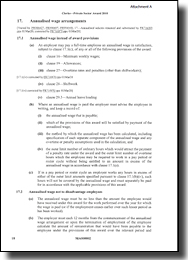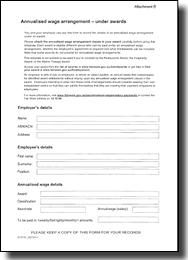As part of the 4 yearly review of modern awards (which commenced in 2014 and is continuing), a Full Bench of the Fair Work Commission (FWC) has decided to replace and/or insert an
annualised wage clause in a number of awards.
Included here is the clause which has commenced to operate in the Clerks – Private Sector Award 2010 from 1 March 2020 – Attachment A.
The Fair Work Ombudsman has prepared a model agreement which it has suggested can be used to reflect an annualised salary arrangement with an employee – Attachment B.
When the Full Bench of FWC finalised these clauses in December 2019, it said:
“We note, as stated in paragraph [22] of the July 2019 decision, that employers may, pursuant to private contractual arrangements, pay employees in accordance with a salary arrangement that compensates for or “buys out” identified award entitlements without engaging with the annualised wage arrangements provisions in the applicable award.”
While the paragraph from the Full Bench may be comforting for employers who consider the award clauses to be overly cumbersome to comply with, it does not address issues arising from
various relevant sections of the Fair Work Act 2009 (Act).
Section 557C of the Act effectively states that if an employer has not kept the records it is required to keep under the Fair Work Regulations, and it is alleged the employer has underpaid an
employee, the employer has the burden of disproving the allegation.
Regulation 3.34 of the Fair Work Regulations states that if a penalty rate or loading must be paid for overtime hours actually worked by an employee, the employer must keep a record of:
- the number of overtime hours worked by the employee during each day; or
- when the employee started and ceased working overtime hours.
We also know that when assessing underpayments in a situation where an employer has not fully complied with the annualised salary arrangements provision of an award which allows for an
annual reconciliation, the Fair Work Ombudsman will assess the amount of underpayment on a pay period by pay period basis.
As a result, employers need to think very carefully about which approach will best suit their compliance regime, including options such as individual flexibility agreements or even reverting
to strict weekly compliance with the relevant award. Employers that intend to rely on common law set-off principles must ensure that an effective set off clause is included in the employment
contract of each salaried employee and the salary paid is actually sufficient to compensate employees for all relevant award entitlements.
Contact us
If you would like advice on which strategy is best for your business or assistance with offset clauses, IFAs or managing the risk of any past underpayment claims, please contact a member
of our Workplace Relations team.
| Disclaimer: This publication contains comments of a general nature only and is provided as an information service. It is not intended to be relied upon as, nor is it a substitute for specific professional advice. No responsibility can be accepted by Rigby Cooke Lawyers or the authors for loss occasioned to any person doing anything as a result of any material in this publication.
Liability limited by a scheme approved under Professional Standards Legislation. ©2020 Rigby Cooke Lawyers |


